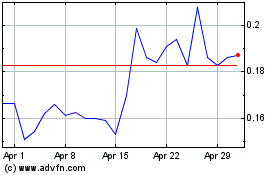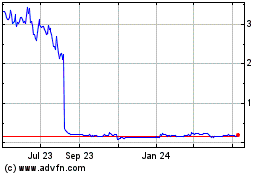Galera Therapeutics, Inc. (Nasdaq: GRTX), a clinical-stage
biopharmaceutical company focused on developing and commercializing
a pipeline of novel, proprietary therapeutics that have the
potential to transform radiotherapy in cancer, today announced the
submission of its New Drug Application (NDA) to the U.S. Food and
Drug Administration (FDA) for avasopasem for radiotherapy-induced
severe oral mucositis (SOM) in patients with head and neck cancer
(HNC) undergoing standard-of-care treatment. The FDA has granted
Fast Track and Breakthrough Therapy designations to avasopasem for
the reduction of SOM induced by radiotherapy. SOM is characterized
by the inability to eat solid food or drink liquids and may require
the surgical placement of feeding tubes to maintain nutrition and
hydration. There are currently no FDA-approved drugs to reduce SOM
for these patients.
"With submission of this NDA, we achieved an important milestone
towards our goal of transforming radiotherapy, potentially bringing
patients with HNC the first approved drug for SOM and relief from
its tremendous burden,” said Mel Sorensen, M.D., President and
Chief Executive Officer of Galera Therapeutics. “Approximately
42,000 patients with HNC undergo standard-of-care radiotherapy
every year in the U.S. and are at risk of developing SOM. Our two
rigorous, placebo-controlled trials which enrolled nearly 700
patients give us confidence that avasopasem has the potential to
provide meaningful clinical benefit for patients by reducing SOM
incidence, days, and severity while also delaying its onset. We
look forward to working closely with the FDA during the review
process.”
Dr. Sorensen continued, “Further, the reduction in
cisplatin-related chronic kidney disease in patients treated with
avasopasem reported in October may offer added clinical benefit to
the large number of patients with HNC who receive cisplatin with
their radiotherapy."
The NDA is supported by the randomized, double-blinded,
placebo-controlled Phase 3 ROMAN and Phase 2b GT-201 trials which
enrolled a total of 678 patients. Results from the 455-patient
ROMAN trial demonstrated a clinically meaningful reduction in
patients’ SOM burden across multiple endpoints, with statistically
significant reductions on the primary endpoint of incidence of SOM
and the secondary endpoint of number of days of SOM, more than
halving the median number of days a patient suffered SOM.
Avasopasem also showed clinically meaningful reductions in severity
of SOM (Grade 4 incidence) compared to placebo. Exploratory
analyses, such as time to SOM onset and SOM incidence at various
landmarks of radiotherapy delivered, further demonstrated the
clinical benefit of avasopasem in reducing the burden of SOM.
Avasopasem was generally well tolerated compared to placebo.
Overall, the adverse event (AE) incidences noted in the clinical
trials were consistent with the interpretation that avasopasem was
not associated with a clinically meaningful increase in the AE
profile expected for the target patient population receiving
standard-of-care chemoradiation therapy. In addition, a
prospectively defined exploratory analysis looking at renal
function through 12 months follow-up showed that avasopasem reduced
cisplatin-induced chronic kidney disease by 50%.
About the Phase 3 Roman Trial
The Phase 3 ROMAN trial (GTI-4419-301) was a randomized,
double-blind, placebo-controlled trial in 455 patients designed to
evaluate the ability of avasopasem to reduce radiation-induced SOM
in patients with locally advanced HNC, receiving seven weeks of
standard-of-care radiotherapy plus cisplatin. Patients were
randomized to one of the two treatment groups (3:2) to receive 90
mg of avasopasem or placebo by infusion on the days they receive
their radiation treatment.
Results from the 455-patient ROMAN trial demonstrated a
meaningful reduction in patients’ SOM burden across multiple
endpoints, with statistically significant reductions on the primary
endpoint of incidence of SOM and the secondary endpoint of number
of days of SOM, more than halving the median number of days a
patient suffered SOM. Meaningful reduction in the number of
patients who developed the most severe form of SOM (Grade 4) was
also observed. Exploratory analyses, such as time to SOM onset and
SOM incidence at various landmarks of radiotherapy delivered, also
demonstrated the clinical benefit of avasopasem in reducing the
burden of SOM, along with a reduction in long-term loss of kidney
function associated with concurrent cisplatin. Avasopasem was
generally well tolerated compared to placebo.
About the Phase 2b GT-201 Trial
The GT-201 trial (GTI-4419-201) was a randomized, double-blind,
placebo-controlled trial in 223 patients designed to evaluate the
ability of avasopasem to reduce radiation-induced SOM in patients
with locally advanced HNC, receiving seven weeks of
standard-of-care radiotherapy plus cisplatin. Patients were
randomized to one of the three treatment groups (1:1:1) to receive
either 30 mg or 90 mg of avasopasem or placebo by infusion on the
days they receive their radiation treatment.
Results from the 223-patient Phase 2b trial demonstrated a
meaningful reduction in patients’ SOM burden across multiple
endpoints, with a statistically significant reduction on the
primary endpoint of number of days of SOM in the 90 mg avasopasem
arm compared to placebo. Avasopasem also resulted in clinically
meaningful reductions in the incidence, severity (Grade 4
incidence), and onset of SOM compared to placebo. Avasopasem was
generally well tolerated compared to placebo. The FDA granted
Breakthrough Therapy designation to avasopasem for the reduction of
SOM induced by radiotherapy, based on the positive results of the
GT-201 trial.
About Severe Oral Mucositis (SOM)
Approximately 42,000 patients with head and neck cancer undergo
standard-of-care radiotherapy every year in the U.S. and are at
risk of experiencing SOM. In patients with head and neck cancer,
radiotherapy is a mainstay of treatment. Approximately 70 percent
of patients receiving radiotherapy for head and neck cancer develop
SOM, defined by the inability to eat solid food or drink liquids.
The impact on patients who develop SOM is substantial, particularly
when hospitalization and/or surgical placement of feeding (PEG)
tubes to maintain nutrition and hydration are required. SOM can
adversely affect cancer treatment outcomes by causing interruptions
in radiotherapy, which may compromise the otherwise good prognosis
for tumor control in many of these patients. There is currently no
drug approved to prevent or treat SOM for these patients.
About Avasopasem
Avasopasem manganese 90 mg (avasopasem, or GC4419) is a
selective small molecule dismutase mimetic in development for the
reduction of radiotherapy-induced severe oral mucositis (SOM) in
patients with locally advanced head and neck cancer (HNC) and for
the reduction of radiotherapy-induced esophagitis in patients with
lung cancer. The FDA has granted Fast Track and Breakthrough
Therapy designations to avasopasem for the reduction of SOM induced
by radiotherapy.
About Galera Therapeutics
Galera Therapeutics, Inc. is a clinical-stage biopharmaceutical
company focused on developing and commercializing a pipeline of
novel, proprietary therapeutic candidates that have the potential
to transform radiotherapy in cancer. Galera’s selective dismutase
mimetic product candidate avasopasem manganese (avasopasem, or
GC4419) is being evaluated for radiotherapy-induced toxicities. The
Company’s second product candidate, rucosopasem manganese
(rucosopasem, or GC4711), is in clinical-stage development to
augment the anti-cancer efficacy of stereotactic body radiation
therapy in patients with non-small cell lung cancer and locally
advanced pancreatic cancer. Galera is headquartered in Malvern, PA.
For more information, please visit www.galeratx.com.
Forward-Looking Statements
This press release contains forward-looking statements within
the meaning of the Private Securities Litigation Reform Act of
1995. All statements contained in this press release that do not
relate to matters of historical fact should be considered
forward-looking statements, including without limitation statements
regarding: the expectations surrounding the continued advancement
of Galera’s product pipeline; the potential safety and efficacy of
Galera’s product candidates and their regulatory and clinical
development; the potential to obtain approval by the U.S. Food and
Drug Administration for avasopasem for the treatment of
radiotherapy-induced severe oral mucositis (SOM) in patients with
locally advanced head and neck cancer; the ability of avasopasem to
provide meaningful clinical benefit to patients by reducing the
number who develop SOM and how long they are afflicted with it; the
ability of avasopasem to delay onset of SOM and decrease the number
of patients who develop the most severe form of SOM; the potential
of avasopasem to offer clinical benefit to a large number of
patients with HNC who receive cisplatin; the clinical benefit in
reducing the burden of SOM along with reduction in long-term loss
of kidney function associated with concurrent cisplatin; and the
Company’s ability to achieve its goal of transforming radiotherapy
in cancer treatment with its selective dismutase mimetics. These
forward-looking statements are based on management’s current
expectations. These statements are neither promises nor guarantees,
but involve known and unknown risks, uncertainties and other
important factors that may cause Galera’s actual results,
performance or achievements to be materially different from any
future results, performance or achievements expressed or implied by
the forward-looking statements, including, but not limited to, the
following: Galera’s limited operating history; anticipating
continued losses for the foreseeable future; needing substantial
funding and the ability to raise capital; Galera’s dependence on
avasopasem manganese (GC4419); uncertainties inherent in the
conduct of clinical trials; difficulties or delays enrolling
patients in clinical trials; the FDA’s acceptance of data from
clinical trials outside the United States; undesirable side effects
from Galera’s product candidates; risks relating to the regulatory
approval process; failure to capitalize on more profitable product
candidates or indications; ability to receive or maintain
Breakthrough Therapy Designation or Fast Track Designation for
product candidates; failure to obtain regulatory approval of
product candidates in the United States or other jurisdictions;
ongoing regulatory obligations and continued regulatory review;
risks related to commercialization; risks related to competition;
ability to retain key employees and manage growth; risks related to
intellectual property; inability to maintain collaborations or the
failure of these collaborations; Galera’s reliance on third
parties; the possibility of system failures or security breaches;
liability related to the privacy of health information obtained
from clinical trials and product liability lawsuits; unfavorable
pricing regulations, third-party reimbursement practices or
healthcare reform initiatives; environmental, health and safety
laws and regulations; the impact of the COVID-19 pandemic on
Galera’s business and operations, including preclinical studies and
clinical trials, and general economic conditions; risks related to
ownership of Galera’s common stock; the possibility of Galera’s
common stock being delisted from The Nasdaq Global Market; and
significant costs as a result of operating as a public company.
These and other important factors discussed under the caption “Risk
Factors” in Galera’s Annual Report on Form 10-K for the year ended
December 31, 2021 filed with the U.S. Securities and Exchange
Commission (SEC), Galera’s Quarterly Report on Form 10-Q for the
quarterly period ended September 30, 2022, and Galera’s other
filings with the SEC could cause actual results to differ
materially from those indicated by the forward-looking statements
made in this press release. Any forward-looking statements speak
only as of the date of this press release and are based on
information available to Galera as of the date of this release, and
Galera assumes no obligation to, and does not intend to, update any
forward-looking statements, whether as a result of new information,
future events or otherwise.
Investor Contacts:Christopher DegnanGalera
Therapeutics, Inc.610-725-1500cdegnan@galeratx.com
William WindhamSolebury Strategic
Communications646-378-2946wwindham@soleburystrat.com
Media Contact:Zara LockshinSolebury Strategic
Communications330-417-6250zlockshin@soleburystrat.com
Galera Therapeutics (NASDAQ:GRTX)
Historical Stock Chart
From Aug 2024 to Sep 2024

Galera Therapeutics (NASDAQ:GRTX)
Historical Stock Chart
From Sep 2023 to Sep 2024
